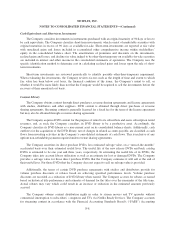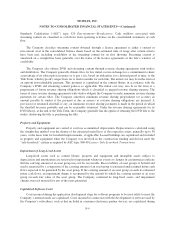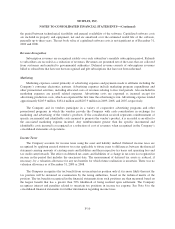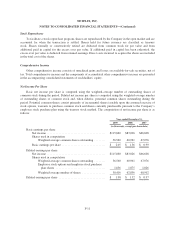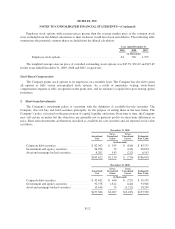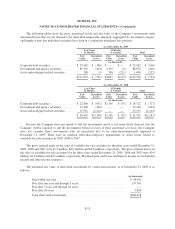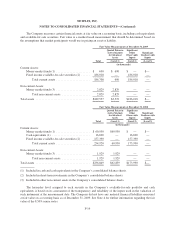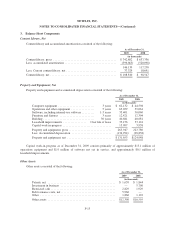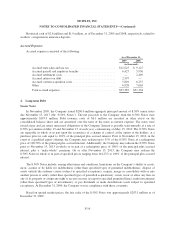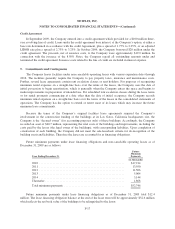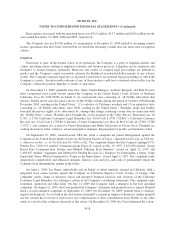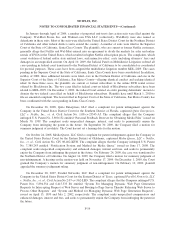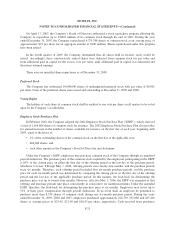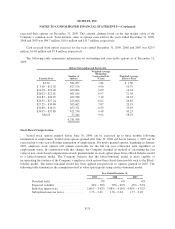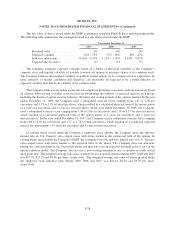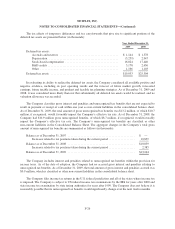NetFlix 2009 Annual Report Download - page 71
Download and view the complete annual report
Please find page 71 of the 2009 NetFlix annual report below. You can navigate through the pages in the report by either clicking on the pages listed below, or by using the keyword search tool below to find specific information within the annual report.NETFLIX, INC.
NOTES TO CONSOLIDATED FINANCIAL STATEMENTS—(Continued)
Rent expense associated with the operating leases was $14.5 million, $13.7 million and $10.6 million for the
years ended December 31, 2009, 2008 and 2007, respectively.
The Company also has $114.8 million of commitments at December 31, 2009 related to streaming content
license agreements that have been executed but for which the streaming content does not meet asset recognition
criteria.
Litigation
From time to time, in the normal course of its operations, the Company is a party to litigation matters and
claims, including claims relating to employee relations and business practices. Litigation can be expensive and
disruptive to normal business operations. Moreover, the results of complex legal proceedings are difficult to
predict and the Company cannot reasonably estimate the likelihood or potential dollar amount of any adverse
results. The Company expenses legal fees as incurred. Listed below are material legal proceedings to which the
Company is a party. An unfavorable outcome of any of these matters could have a material adverse effect on the
Company’s financial position, liquidity or results of operations.
On December 17, 2009, plaintiffs Jane Doe, Nelly Valdez-Marquez, Anthony Sinopoli, and Paul Navarro
filed a purported class action lawsuit against the Company in the United District Court, District of Northern
California, Case No. C09-05903 on behalf of (1) a nationwide class consisting of “all Netflix subscribers that
rented a Netflix movie and also rated a movie on the Netflix website during the period of October 1998 through
December 2005, residing in the United States,” (2) a subclass of California residents and (3) an injunctive class
consisting of “all Netflix subscribers since 2006, residing in the United States.” Plaintiffs allege that Netflix
breached the privacy rights of its subscribers by, among other things, releasing certain data in connection with
the “Netflix Prize” contest. Plaintiffs have brought this action pursuant to the Video Privacy Protection Act, 18
U.S.C. § 2710; California Consumers Legal Remedies Act, Civil Code § 1750 (“CLRA”); California Customer
Records Act, Civil Code § 1798.80; California’s Unfair Competition Law, Bus. & Prof’l Code §§ 17200, 17500
(“UCL”); and common law actions for Unjust Enrichment and Public Disclosure of Private Facts. Plaintiffs are
seeking declaratory relief; statutory, actual and punitive damages; disgorgement of profits; and injunctive relief.
On September 25, 2009, Alcatel-Lucent USA Inc. filed a complaint for patent infringement against the
Company in the United States District Court for the Eastern District of Texas, captioned Alcatel-Lucent USA Inc.
v. Amazon.com Inc., et. al, Civil Action No. 6:09-cv-422. The complaint alleges that the Company infringed U.S.
Patents Nos. 5,649,131 entitled “Communications Protocol” issued on July 15, 1997, 5,623,656 entitled “Script
Based Data Communication System and Method Utilizing State Memory” issued on April 22, 1997 and
5,404,507 entitled “Apparatus and Method for Finding Records in a Database by Formulating a Query Using
Equivalent Terms Which Correspond to Terms in the Input Query” issued April 4, 1995. The complaint seeks
unspecified compensatory and enhanced damages, interest, costs and fees, and seeks to permanently enjoin the
Company from infringing the patents in the future.
On April 1, 2009, Jay Nunez, individually and on behalf of others similarly situated in California, filed a
purported class action lawsuit against the Company in California Superior Court, County of Orange. The
complaint asserts claims of unlawful, unfair and deceptive business practices and violation of the California
Consumer Legal Remedies Act relating to certain of the Company’s marketing statements. The complaint seeks
restitution, injunction and other relief. On July 14, 2009, the Company filed a demurrer to the first amended
complaint. On August 21, 2009, the Court granted the Company’s demurrer and granted leave to amend. Plaintiff
filed a second amended complaint on September 11, 2009. On November 30, 2009, plaintiff filed a voluntary
request for dismissal. As set forth in the declaration of plaintiff’s counsel in support of dismissal, neither plaintiff
nor his counsel has received or will receive any compensation or other consideration from Netflix or any other
entity as a result of the voluntary dismissal of this action. On December 18, 2009, the Court dismissed the action.
F-18


